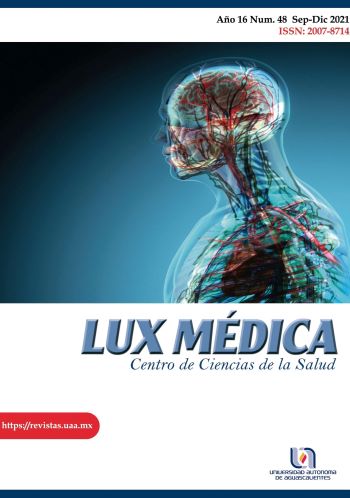Revisión bibliográfica de los avances más recientes en la comprensión etiológica de la enfermedad de Alzheimer
DOI:
https://doi.org/10.33064/48lm20212964Palabras clave:
enfermedad de Alzheimer, péptido β-amiloide, hiperfosforilación de TAU, Enfermedades vasculares, gen APOE-4Resumen
La enfermedad de Alzheimer (EA) es una condición neurodegenerativa caracterizada por una desintegración continua y homogénea, la cual ocasiona una pérdida progresiva de la memoria y deterioro de las capacidades cognitivas. La EA representa más del 60% de los casos de demencia en adultos de 65 años o más, con una afectación predominante en las áreas frontal y temporales del cerebro. Las dos hipótesis principales con respecto al desarrollo de EA son la hiperfosforilación de la proteína TAU, la cual en situaciones normales forma parte de los axones neuronales, siendo la encargada de la unión de microtúbulos asociados al citoesqueleto de la célula, cuya malformación conduce a ovillos neurofibrilares y muerte neuronal; y la hipótesis amiloide, que describe la acumulación de placas Aβ , generadas mediante la agregación extracelular de péptidos β-amiloides insolubles. En el presente artículo de revisión se realiza una búsqueda en la literatura moderna sobre la etiología de la EA, creando una recopilación de los mecanismos más estudiados recientemente en la enfermedad, y como estas puedan interactuar entre sí; incluyendo los últimos avances respecto a la proteína tau, el péptido β-amiloide (Aβ), el gen APOE-4, la disfunción mitocondrial, enfermedades vasculares y la proteína alfa sinucleína entre otras; así como las principales áreas cerebrales afectadas por este padecimiento. También se evalúan distintos tratamientos empleados a partir de la etiología conocida, buscando la eliminación de placas Aβ del parénquima cerebral y la detención de la formación de los enredos neurofibrilares característicos de esta patología.
Descargas
Publicado
Cómo citar
Número
Sección
Licencia
Derechos de autor 2021 Uziel Téllez

Esta obra está bajo una licencia internacional Creative Commons Atribución-NoComercial-CompartirIgual 4.0.
La revista Lux Médica está bajo una licencia de Creative Commons Reconocimiento-NoComercial-Compartir Igual 4.0 Internacional.












